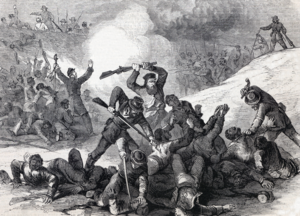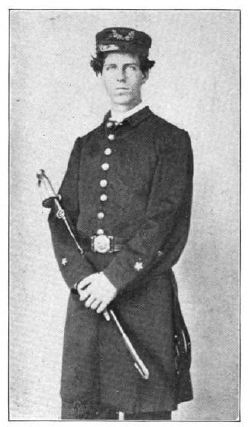
An account of the Fort Pillow Massacre in a Letter from Naval Officer Robert S. Critchell, published in the New York Times on 3 May 1864 -- The following letter has just been received by Mr. BLOW, a member of Congress in Washington, D.C from Missouri, respecting the treatment of our soldiers after the surrender of Fort Pillow:

UNITED STATES STEAMER "SILVER CLOUD," MISSISSIPPI RIVER, April 22, 1864.
SIR: Since you did me the favor of recommending my appointment last August, I have been on duty aboard this boat.
I now write you with reference to the Fort Pillow massacre. I write, because most of our crew are colored, and I feel personally interested in the retaliation which our Government may deal out to the rebels, when the fact of the mereiless butchery is fully established.
Our boat arrived at the fort about 7 1/2 A.M., on Wednesday, the 13th, the day after the rebels captured the fort. After shelling them, whenever we could see them, for two hours, a flag of truce from the rebel Gen. CHALMERS was received by us, and Capt. FERGUSON, of this boat, made an arrangement with Gen. CHALMERS for the paroling of our wounded and the burial of our dead; the arrangement to last until 5 P.M. We then landed at the fort, and I was sent out with a burial party to bury our dead.
I found many of the dead lying close along by the water's edge, where they had evidently sought safety; they could not offer any resistance from the places where they were, in holes and cavilles along the banks; most of them had two wounds. I saw several colored soldiers of the Sixth United States Artillery, with their eyes punched out with bayonets; many of them were shot twice and bayonetted also. All those along the bank of the river were colored. The number of the colored near the river was about seventy. Going up into the fort, I saw there bodies partially consumed by fire. Whether burned before or after death I cannot say, any way there were several companies of rebels in the fort while these bodies were burning, and they could have pulled them out of the fire had they chosen to do so.
One of the wounded negroes told me that he had'nt done a thing, and when the rebels drove our men out of the fort they (our men) threw away their guns and cried out that they surrendered; but the rebels kept on shooting them down until they had shot all but a few. This is what they all say.

I had some conversation with rebel officers, and they claim that our men would not surrender, and in some few cases they could not control their men, who seemed determined to shoot down every negro soldier, whether he surrendered or not. This is a flimsy excuse, for after our colored troops had been driven from the fort, and they were surrounded by the rebels on all sides, it is apparent that they would do what all say they did, throw down their arms and beg for mercy.
I buried but very few white men; the whole number buried by my party and the party from the gunboat New Era was about one hundred.
The rebels had burned some of the white dead.
I can make affidavit to the above if necessary.
Hoping that the above may be of some service and that a desire to be of service will be considered sufficient excuse for writing to you, I remain, very respectfully, your obedient servant,

ROBERT S. CRITCHELL, Acting-Master's Mate, U.S.N., Hon. H.T. BLOW, member of Congress, Washington, D.C. (source: New York Times)
No comments:
Post a Comment